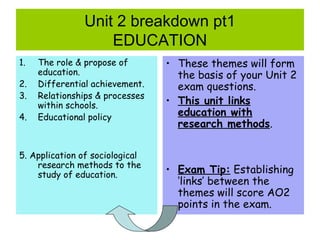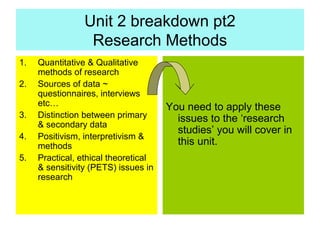Education ~ an introduction to unit 2
- 1. Introduction ŌĆó You have 180 seconds to define ŌĆśeducationŌĆÖ. What is education?
- 2. A/s Sociology Unit II The Sociology of Education with research methods
- 3. ŌĆ£The roots of education are bitter, but the fruit is sweetŌĆØ.
- 4. Collins New English Dictionary ŌĆó Education (n) ~ Instruction & training, as imparted in schools, colleges & universities: the theory & practise of teaching.
- 5. Oxford Dictionary of Sociology ŌĆó ŌĆó Education: Sociological concept donating ideologies, curricula & pedagogical techniques of the inculcation & management of knowledge& the social reproduction of personalities & cultures.
- 6. Unit 2 breakdown pt1 EDUCATION 1. The role & propose of education. 2. Differential achievement. 3. Relationships & processes within schools. 4. Educational policy 5. Application of sociological research methods to the study of education. ŌĆó These themes will form the basis of your Unit 2 exam questions. ŌĆó This unit links education with research methods. ŌĆó Exam Tip: Establishing ŌĆślinksŌĆÖ between the themes will score AO2 points in the exam.
- 7. Unit 2 breakdown pt2 Research Methods 1. Quantitative & Qualitative methods of research 2. Sources of data ~ questionnaires, interviews etcŌĆ” 3. Distinction between primary & secondary data 4. Positivism, interpretivism & methods 5. Practical, ethical theoretical & sensitivity (PETS) issues in research You need to apply these issues to the ŌĆśresearch studiesŌĆÖ you will cover in this unit.
- 8. 1. Theoretical Perspectives Key Perspectives Marxism(s) Feminisms Symbolic Interactionism (AKA Interpretive Sociology) Functionalism The New Right Post Modernism
- 9. 2. Differential Attainment ŌĆó Sociological explanations of why some social groups underachieve in education. ŌĆó Focus on 1. Class 2. Gender 3. Ethnicity
- 10. 3. Development of the education system ŌĆó Social policy & the impact on education in the UK Focus on: ŌĆó 1870 Educ. Act ŌĆó 1944 Educ. Act & the Tripartite System ŌĆó The Comprehensive Ideal ŌĆó Thatcher & the 1988 ERA (Education Reform Act) ŌĆó 1997 & New Labour ~ Curriculum 2000 & beyond. ŌĆó Various other plans from government or individual schools.
- 11. 4. Relationships & processes within schools ŌĆó What actually ŌĆśgoes onŌĆÖ within a school? ŌĆó Teacher ~ pupil relationships & labelling. ŌĆó Pupil sub-cultures ŌĆó The hidden curriculum. ŌĆó How teaching & learning is organised.
- 12. Is education just about school? What do the following quotes mean to you? ŌĆó An educated person is one who has learned that information almost always turns out to be at best incomplete and very often false, misleading, fictitious, mendacious - just dead wrong. ~ Russell Baker ŌĆó Education is simply the soul of a society as it passes from one generation to another. ~ Gilbert K. Chesterton ŌĆó Good teaching is one-fourth preparation and three-fourths pure theatre. ~ Gail Godwin ŌĆó He who opens a school door, closes a prison. Victor Hugo ŌĆó The whole purpose of education is to turn mirrors into windows. Sydney J. Harris ŌĆó To be yourself in a world that is constantly trying to make you something else is the greatest accomplishment. Ralph Waldo Emerson












